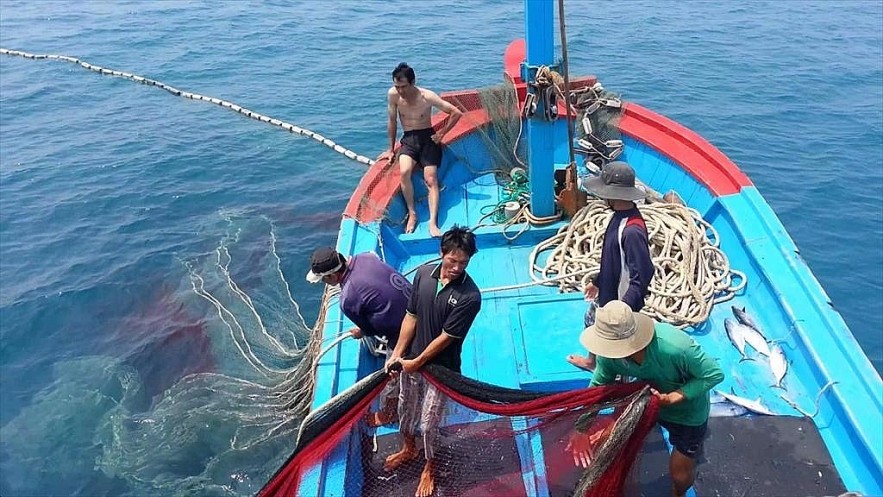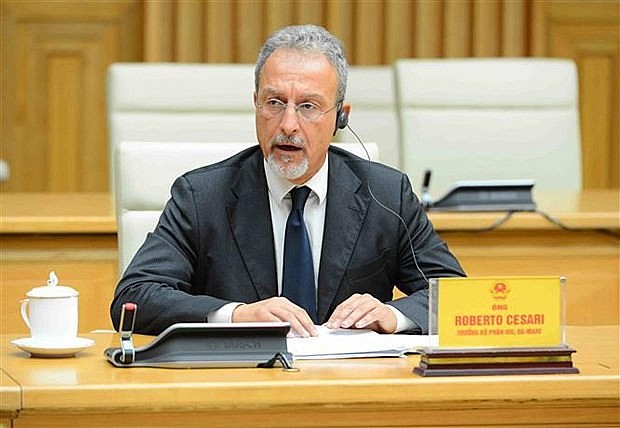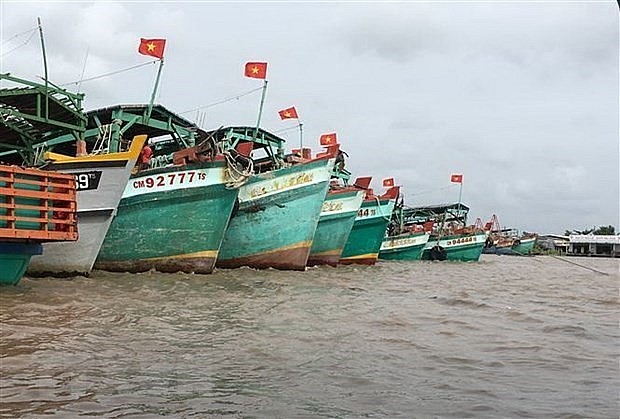 |
| The EC delegation highly values Vietnam’s efforts to engage the entire political system in drastic and methodological measures to combat IUU fishing. Photo: VIR |
From October 20 to 28, a delegation from the EC visited Vietnam to check measures against illegal, unreported, and unregulated (IUU) fishing.
At a meeting with Deputy Prime Minister Le Van Thanh in Hanoi on October 28, Cesari stressed that fighting IUU fishing is an increasing priority in the EU’s agenda, and that the bloc views this as a top priority in its and each of its members’ cooperation with partner countries, VietnamPlus reported.
The EC delegation highly values Vietnam’s efforts to engage the entire political system in drastic and methodological measures to combat IUU fishing, he said, noting that through random examination of coastal localities, the delegation has seen considerable progress and improvements in anti-IUU fishing actions, including boosting information transparency and improving capacity for fisheries management personnel in 28 coastal localities.
It perceived that Vietnam has taken drastic actions at the central level as seen in the issuance of many legal regulations, mechanisms, and policies for IUU fishing prevention, but the enforcement at the grassroots level is still weak.
 |
| Roberto Cesari, head of the anti-IUU fishing unit of the EC’s Directorate-General for Maritime Affairs and Fisheries, at the meeting. Photo: VNA |
In the time ahead, the country should have effective management mechanisms with strict legal regulations, ensure consistent and uniform enforcement from the central to local levels, stringently deal with all violations, devise an all-round plan for managing fishery resources and strictly controlling the import of fishery materials for export processing, and eradicate fishermen’s infringement of foreign waters, Cesari said.
The delegation is set to make another examination and assessment trip to Vietnam in the next six months, the official added.
For his part, Thanh appreciated the recommendations by the EC’s Directorate-General for Maritime Affairs and Fisheries to help Vietnam deal with IUU fishing, noting that most of these recommendations match the country’s policy of promoting responsible fisheries and sustainable development of the industry.
Thanh underlined that Vietnam has been making all-out efforts to handle the EC’s recommendations in the best possible manner to develop a sustainable, responsible, and well-controlled seafood fishing industry. He also reaffirmed the strong commitment and joint efforts by authorities, fishermen, and businesses to prevent, end, and eradicate IUU fishing.
However, the Deputy PM noted, Vietnam’s fishing grounds in the Bien Dong Sea (South China Sea) are affected by many factors while its resources remain modest, so the IUU fishing combat needs great efforts, a roadmap, and time to sustainably put an end to the IUU fishing.
Given this, he called on the EC and EU member states to keep close cooperation with and timely technical assistance for Vietnam, with specific features of the country’s fisheries industry taken into account, to implement the recommendations.
He asked the EC to recognise Vietnam’s efforts against IUU fishing and the positive results obtained, and to lift the “yellow card” warning for the country.
Great efforts made in combating IUU fishing
 |
| Fishing vessels of Ca Mau province. Photo: VNA |
Right after the issuance of the yellow-card warning from the EC in 2017, Vietnam has been actively focusing on drastic actions as per EC’s recommendations and regulations on IUU in order to remove the warning as soon as possible, according to Vietnam Investment Review.
There are three groups of solutions as follows:
The first one is institutional refinement, to keep in line with international regulations, including from the EU. This group includes reviewing and supplementing legal documents and enhancing sanctions in the revised Fisheries Law, documents, and action plans of the government.
The second one is to impose strict punishments for violations, improve the enforcement capacity of the state management system and fishermen in Vietnam, and end the situation of fishing vessels engaged in illegal fishing in the waters of other countries.
The third one is to strengthen communication, information, and training to make the system of state management of fisheries, businesses and especially the boat owners and fishermen understand about what are the measures to combat illegal unregulated fishing in practice.
Following the EC’s issuance of the warning, to the Vietnam Association of Seafood Exporters and Producers (VASEP) established an executive board and a programme titled “Seafood Enterprises’ Commitment to Combating IUU Fishing” in 2017 with many activities in companionship with the government to remove the yellow card.
The board has cooperated with various local and international parties. Specifically, the board has joined forces with localities to organise working sessions with fishermen to grasp problems in the process of combatting IUU fishing.
The association has conducted communication activities about Vietnam’s actions against IUU fishing on national and local newspapers, radio stations, and VASEP’s information systems. It has created and published brochures and videos to disseminate information on IUU to relevant stakeholders in the seafood exploitation and processing chain./.
|
In 2017, the EC issued a warning against Vietnamese fishery products exported to the EU. The decision had an impact on the country’s seafood exports to the EU, which account for 16–17% of the country’s annual seafood export value. In August, Vietnam saw an increase in seafood exports to the EU, up 95% from last year’s period, according to the Vietnam Association of Seafood Exporters and Producers (VASEP). Vietnam’s seafood exports decreased to less than $1 billion in July after sustaining above $1 billion in a row from March to June. This trend was sustained in August with sales down to $917 million, which is 3% less than the turnover for July. |








